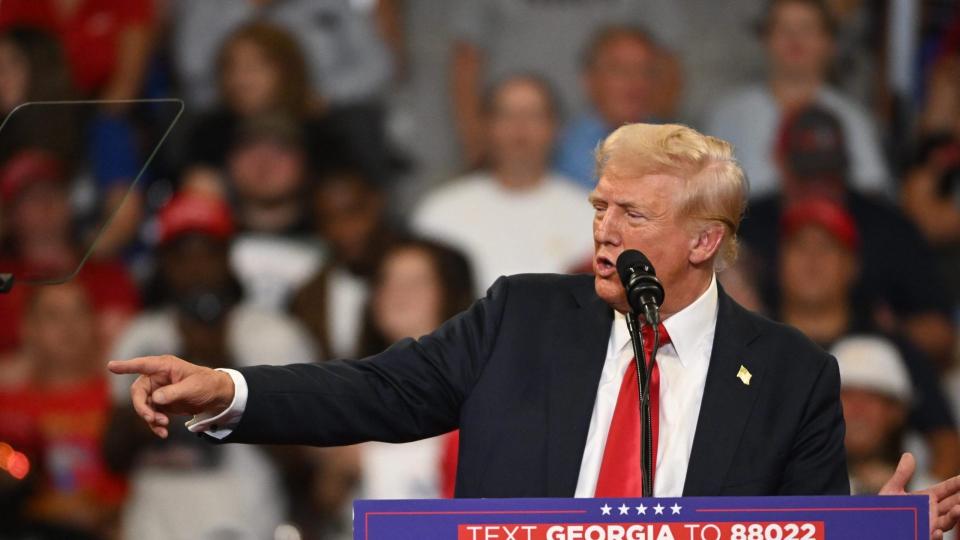Trump Wants To Eliminate Income Taxes: How Would This Impact the Lower Middle Class?

Republican presidential nominee Donald Trump has put forward the idea of an “all-tariff policy.” This is familiar territory for Trump, as he was an avid supporter of tariffs during his first term as president. Though this proposal to replace the federal income tax seems like it would ease the tax burden, experts say that’s not necessarily the case.
Also Read: Trump Wants To Eliminate Income Taxes — How Would That Impact You If You Are Retired?
Try This: 6 Money Moves You Must Make if You Want to Be Like the Wealthy
“Tariffs are ultimately paid by consumers, not producers,” said Michael Montgomery, a lecturer in the department of health and human services at University of Michigan-Dearborn. “They are, effectively, a secret sales tax on non-U.S. origin products.”
Read on to see how eliminating income tax would affect the lower middle class in America.
Earning passive income doesn't need to be difficult. You can start this week.
Bigger Paychecks
“Those belonging to the lower middle class would benefit by experiencing immediate relief due to the abolition of income tax,” said Daniel Anderson, a certified financial planner. “More money in pocket means that one can take up immediate financial needs like paying off debts, meeting essential expenses or saving up for a rainy day.”
Federal income tax ranges between 10% and 37% of your income, depending on how much you make. If you’re in the lower middle class, you make between $30,001 and $58,020. If there is no income tax, the good news is your paycheck is going to be 10% to 22% larger.
“Take-home pay would increase significantly without income tax deductions,” said Dr. Jim Ronan, a lecturer in the department of political science at Villanova University.
This could make a difference in financial portfolios. Ronan said this would give those in the lower middle class a chance to invest some of the extra income they would keep.
“For the lower middle class, earners who are just beginning their careers would have more income to utilize and perhaps invest in long-term retirement and savings accounts,” he said. “This would help to address the increasing percentage of younger workers who are unable to save money for later in life.”
More Expensive Goods
If our economy were to become dependent on tariffs, inflation would be an issue.
“Trump’s plan to increase tariffs to offset the loss of revenue would result in sticker shock, as the price of goods and services would likely rise significantly and quickly,” Ronan said.
The lower middle class would especially be affected by these rising prices. Montgomery said that nixing the income tax and switching to an all-tariff approach would mean the lower middle class would end up spending more of their salary as consumers.
He explained: “Tariffs are regressive because less affluent citizens must spend a larger portion of their total income than more affluent citizens in order to buy what they need.”
Anderson said lower middle class consumers could see other taxes go up as well.
“Destination-based taxes, such as sales or property taxes, would likely increase to make up for the reduction in income tax revenues.”
Shopping for anything likely would become more expensive.
Burden to Social Programs
Goods wouldn’t be the only items affected with the loss of income taxes. Anderson highlighted that social programs would also suffer — directly impacting the lower middle class.
“Eliminating income tax revenue puts a burden on social safety net programs designed especially for poor and lower-income households,” Anderson said. “Such programs as Medicaid, food aid and housing subsidies are all designed and adequately funded by government revenues derived from income taxation. With lower funding, this would translate into cuts to eligibility, benefit reductions or longer wait times for services — each depressing lower-middle-class family stability and well-being.”
Greater Income Inequality
Because the lower middle class most likely would be forced to pay a higher percentage of their salary toward goods and social programs, Chuck Warren, host of “Political Podcast,” said the gap between the upper class and lower middle class will widen.
“Although it would provide immediate relief in terms of money, this policy could also increase economic inequality,” Warren said. “The rich parts of society may disproportionately gain from it, which can lead to a wider divide between upper-middle-class members and those from the low class.”
In sum, Warren said, although there might be a jolt to the lower middle class’s paychecks, there would be other problems for them if there was no income tax.
“While getting rid of income taxes can give immediate financial relief to both upper and lower middle classes, it could give rise to several long-run problems like inflation, reduced public services or increased economic inequality.”
More From GOBankingRates
Mechanics Explain Why You Should Never Buy These 6 Popular Car Brands
9 Things the Middle-Class Should Consider Downsizing To Save on Monthly Expenses
This article originally appeared on GOBankingRates.com: Trump Wants To Eliminate Income Taxes: How Would This Impact the Lower Middle Class?